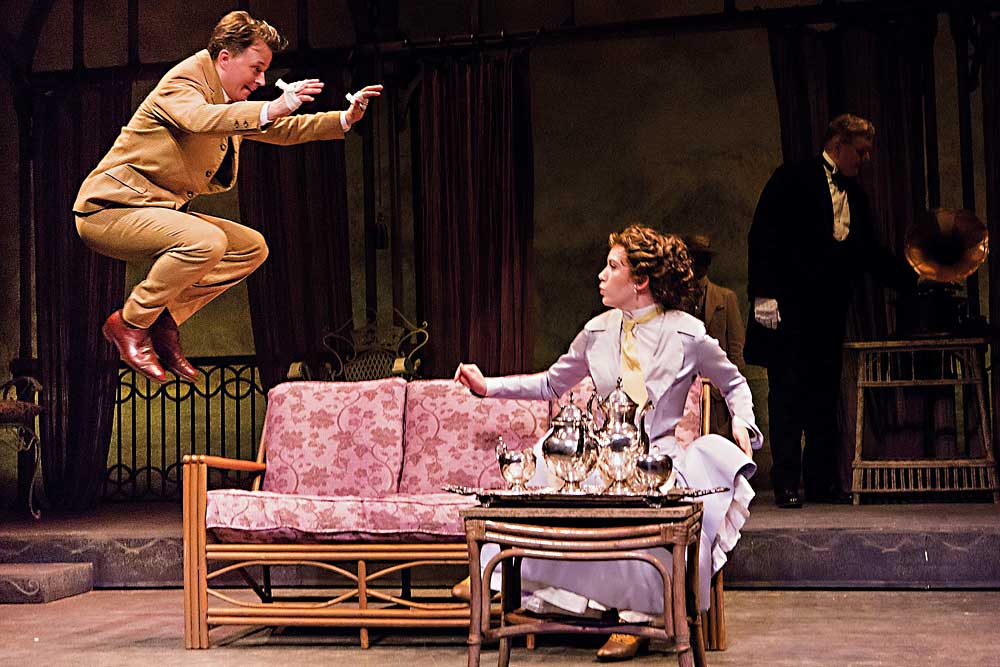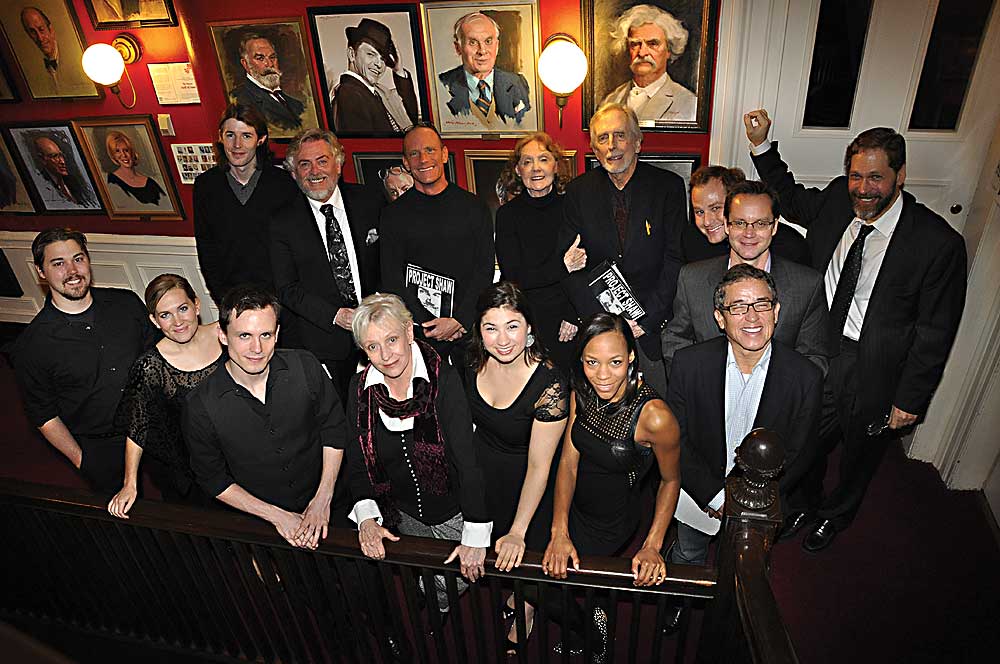Not least among the pleasures of attending a Project Shaw evening is watching artistic director David Staller work the room.
Every month since January 2006 (with Augusts off), Staller has directed a staged reading of one of George Bernard Shaw’s plays. He’s done all 65 of them at least once, some as many as four times, but he still has a GBS–like twinkle in his eyes as he flogs raffle tickets to an invariably sold-out house, urging the audience to “help send my cats to college” and offering prizes from scripts to tote bags.
He greets many of those present by name and never forgets to thank his active, financially supportive board of directors. In his mid-50s, sporting a Shavian beard flecked with gray and spectacles that wouldn’t look out of place on a member of the Fabian Society, Staller has a courtly manner ever so slightly tempered by an undercurrent of irony as he clasps hands meaningfully and says, “How wonderful to see you.” He may have sidelined his acting career, but he invites you to enjoy his performance as impresario, cheerleader and tireless fundraiser.
There’s no play-acting, however, about Staller’s commitment to and ambitions for the organization he founded nearly nine years ago. The Gingold Theatrical Group, declares its mission statement, “is dedicated to presenting plays about human rights using the work of George Bernard Shaw as our platform…while encouraging individuals to breathe these humanitarian ideals into their contributions for the future.”
Project Shaw is the organization’s longest-running effort, but its widest-ranging is Shaw New York, an annual festival launched in 2012. Centered on a fully staged Shaw play, the festival also includes a scholarly symposium about the play; another symposium addressing the role of criticism; a concert featuring music that GBS. championed; and the reading of a script from Press Cuttings, a new-play-development program aimed at encouraging theatre journalists to follow Shaw’s path from drama critic to practicing playwright.
“Just putting on a Shaw play isn’t the point—it’s everything around it,” says Staller. “The idea is to make Shaw New York a more community-driven, all-encompassing event. I would like the festival to become an active and ongoing part of the fabric of New York.”
Count at least one of Staller’s goals met, according to David Cote, theatre editor at Time Out New York.
“David has definitely enlarged the audience for Shaw in New York,” says Cote. “What he’s doing is radical in the sense that he doesn’t think these plays are just polite little conversations; there’s more at stake. He tries to find the living core of the play, and that’s fresh. Shaw on the page is ridiculously dense with predetermined rhetorical elegance, and yet the language is incredibly alive. It’s a real dance between ‘People don’t talk that way!’ and ‘Yes, but these people have to talk that way.’ David is very good at making sure the characters and their actions are believable, but also allowing the intellectual energy of a play its full scope. I think he’s made people realize that the plays can actually be funny and passionate.”
Cote is among the many theatre journalists Staller has inveigled into offering introductory remarks before a Project Shaw reading (American Theatre’s Rob Weinert-Kendt is another), and he’s also a member of an even smaller group: one of three critics commissioned to write plays for Press Cuttings. An untitled script by Newsweek’s Jeremy McCarter was workshopped in 2012, and The Last Word by Robert Simonson, who writes for Playbill, has been through several drafts. Cote’s comedy of ideas, Otherland, has had the most sustained development, with readings at Shaw New York in 2012 and 2013 that featured such prominent New York talents as Laila Robins, Condola Rashad and Harriet Harris (a new draft will get a reading in December as part of the 2014 festival).
“I’m trying to juggle a lot of ideas about identity and belonging and crossing borders,” Cote explains. “David didn’t say, ‘Write a play like Shaw,’ but I think because that’s his passion, his influence may have pushed it in a certain direction.”
While the new-play readings are an important element of Shaw New York, the festival’s flagship remains that year’s full-scale Shaw production. Shaw New York 2012 spotlighted Man and Superman, done as a joint venture with the Irish Repertory Theatre. Staller directed a nicely balanced rendering of one of Shaw’s most difficult plays, slashing it by more than two hours but preserving the often cut “Don Juan in Hell” act.
He followed it up in 2013 with a romp at the Pearl Theatre Company, the seldom-seen You Never Can Tell. Headlining Shaw New York 2014 will be Major Barbara, a coproduction with the Pearl opening this month and featuring company regulars Dan Daily as the munitions manufacturer Andrew Undershaft and Richard Gallagher as Dolly Cusins, the sardonic professor he entices to abandon Greek for gunpowder. Joining them as the fervent Salvation Army major, Undershaft’s daughter and adversary, is Hannah Cabell, Project Shaw’s first Eliza in a 2007 Pygmalion.
 The playwright’s challenging ethos has inspired Staller since he was a boy. While visiting his father in London at age 10, he turned on the radio to find a musical voice with a faint Irish accent emanating from a vintage BBC program. “I heard Shaw say, ‘Life isn’t about finding yourself. Life is about creating yourself,’” he recalls, “and it absolutely floored me. That expression has goaded me all of my life. How far do I dare to be an iconoclast or simply make bold choices for my life without allowing myself to be dictated by what I feel is expected of me? We are the sum of our decisions.”
The playwright’s challenging ethos has inspired Staller since he was a boy. While visiting his father in London at age 10, he turned on the radio to find a musical voice with a faint Irish accent emanating from a vintage BBC program. “I heard Shaw say, ‘Life isn’t about finding yourself. Life is about creating yourself,’” he recalls, “and it absolutely floored me. That expression has goaded me all of my life. How far do I dare to be an iconoclast or simply make bold choices for my life without allowing myself to be dictated by what I feel is expected of me? We are the sum of our decisions.”
Staller was playing Praed in Mrs. Warren’s Profession at the Irish Rep when he decided that a monthly dose of GBS. was just what New York needed. He’d been alarmed in the wake of the 2004 Iraq invasion by “the way the administration manipulated 9/11 to control what was going on in this country. It was a world being governed by fear, and I felt deeply concerned.” He tried to interest Irish Rep leaders Charlotte Moore and Ciarán O’Reilly—and “everyone else I knew who had a company”—in sponsoring Project Shaw, but they all had the same reaction: “You’ll never get the talent. You’ll never get the space. You won’t be able to rehearse enough. What will the Equity agreement be?”
So Staller formed Gingold Theatrical Group (named in honor of actress Hermione Gingold, whom he had known since childhood) as a 501(c)(3) umbrella for his Shavian mission. He booked a Monday each month for a year at the Players Club, of which he is a member, with the understanding that low attendance would cancel the arrangement. On the contrary, from Project Shaw’s launch in January 2006 with the pointed selection of Arms and the Man, every reading sold out. They continued to sell out after the series moved to Symphony Space last October, and the new uptown location has expanded the audience base.
Marian Seldes, Brian Murray, Rebecca Luker, Fritz Weaver and Tovah Feldshuh are among the prominent theatre figures Staller has been able to enlist. “The actors call it ‘Shaw camp,’” he says. “Most of them have never had a chance to work on Shaw, certainly not in the roles I cast them in; they get to stretch themselves.” Staller is quick to add that he pays the performers, as required by the special agreement Equity wrote for the readings, and that he goes beyond the agreement to provide food during the five-hour rehearsal and a catered dinner before the performance. “I try to do everything that I thought was lacking when I was an actor doing these kind of readings. The script is in a binder, large type and single-sided pages, with pencils and highlighters for notes. I provide dramaturgy for each play.”

Observing Staller at a Project Shaw rehearsal, it’s easy to understand why he has as yet been unable to persuade anyone else to direct one of the readings. Guiding actors through the Shavian ballet of language and ideas in a single afternoon virtually mandates the intimate familiarity with the play and its history that he possesses—which results from a daunting amount of preparation. Staller assembles each script from multiple versions (Shaw liked to rewrite), then consults production notes and letters for clarification of the playwright’s intentions. In rehearsal, he’s not shy about explaining a character’s motivations or the subtext for a particular line; occasionally he coaches people beat by beat through an exchange, almost like a silent movie director.
“Clearly, I have a very specific point of view,” he acknowledges. “I have an agenda with each of these plays, which is the mission of our company: to remind us we’re in charge of our lives, it’s up to us to make good in the world, and we can only do that one person at a time. Only twice in nine years have I ever had an actor resent that approach.”
He’s somewhat less hands-on, Staller says, when directing a full-scale production with a normal rehearsal period. Nonetheless, he says, “I like to get the whole thing staged as quickly as possible, then let them play with it; I think it’s very difficult for actors to flounder around, figuring out where they want to stand or move. I also want them to be off book as soon as possible. To have to go home and memorize when you’re exhausted after a full day of rehearsing seems mad.
“There’s a whole discipline of working with Shaw that’s quite different than working with most other playwrights,” he continues. “Part of it is the complexity of the text; he writes in an extremely irregular rhythm, so getting the words early is really helpful. But what’s thrilling is that, like Shakespeare, Shaw needs to be spoken; the thoughts have to occur on the line.
“And there’s so much subtext; Shaw was fascinated by Freud and by psychological explorations of human behavior, the inexplicable elements of why we are who we are. So in rehearsal there’s so much room for interpretation, but you need to keep the focus on what the play is meant to be saying.”
One of the principal things Major Barbara is saying, Staller notes, is that ideas need to be put into action. “It’s one thing to be picketing Wall Street in a tent; it’s another to actually be one of them and make change. That’s what Barbara finally realizes—it’s not going to do anybody any good if she stands outside the arms factory with a sign; she has to get in there. Clearly it’s Barbara who’s going to be running the company, not Dolly, and clearly it’s what Undershaft had in mind from the beginning.” But can she really “make war on war” as a weapons manufacturer?
“Well, then the curtain comes down!” Staller replies. “Shaw makes a deliberate point of encouraging the audience to feel as though the entire play they’ve just experienced is the preface to what is about to happen. He wants people to be walking up the aisle at the end arguing.”
New York City–based arts reporter Wendy Smith writes frequently for this magazine.


